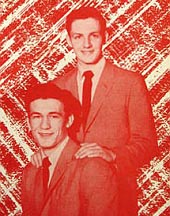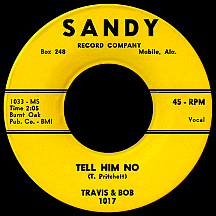TRAVIS AND BOB
Tell Him No
The Sandy label of Mobile, Alabama released about 40 records between 1957 and 1962, plus a handful of others on two subsidiary labels. The artists were mostly country singers and rock and rollers, yet only one record in all that time, a song influenced by The Everly Brothers called "Tell Her No," was a national hit. The song's originators, Travis and Bob, became something of an overnight success, carrying the momentum through the song's chart run in the spring of 1959 but not much further. After that it was just one disappointment after another until the frustrated duo split up about two years later.
In 1955, aspiring country singer Johnny Bozeman moved to Mobile from Gulfport, Mississippi (about 60 miles down the road) to take a shot at making a record. "She's My Bayou Babe" was an unsuccessful effort for the Fine label that year; the usually upbeat reviewers at Billboard magazine didn't take kindly to his singing or ability as a songwriter, suggesting he "handicaps himself with very thin material of his own cleffing." By 1957, Paul DuBose, also from Gulfport, was working as a disc jockey at a Mobile radio station. The two launched Sandy Records with another single by Bozeman.
Travis Pritchett and Bob Weaver grew up together in the small city of Jackson, Alabama, about 70 miles north of Mobile. Towards the end of 1958, they made demo recordings of "Tell Him No" and a ballad, "We're Too Young," both written by Pritchett, at a small studio in Mobile. Making connections along the way, they wound up getting the songs released by Sandy. Local stations picked up on the midtempo teen rocker and before long DuBose and Bozeman felt the pinch of trying to keep up with demand. They made a distribution arrangement with Randy Wood of Dot Records (a Tennessee label that, after hitting the bigtime with artists like Pat Boone, Billy Vaughn and Gale Storm, had moved its operation to Los Angeles). One side of the story is that DuBose didn't have enough ready cash to grease the palms of deejays (the coming payola scandal still about a year away) so he hedged his bets by entering into the deal with Dot for 12 thousand dollars up front and half the profits; if asked, Wood would certainly have denied any "pay for play" tactics.

"Tell Him No" caught on quickly, debuting on the charts near the end of March 1959. Breaking into the top 40 two weeks later, it was a top ten hit by the end of April. The melodically appealing tune didn't go unnoticed within the industry; the Shreveport, Louisiana-based Mathis brothers, Dean and Marc, wasted no time in getting out a similar-sounding version on the Bullseye label that caused some confusion; it debuted on the chart the same week as the original but faltered early, losing momentum and peaking just below the top 40 as Travis and Bob stormed the top ten. Additional versions appeared by "I'm Available" girl Margie Rayburn on Liberty, The Jackson Brothers on Atco (a Jerry Leiber-Mike Stoller production) and several others. In Australia, another cookie-cutter cover a la Dean and Marc was a hit for Ted Hamilton and Ray Melton, performing together as Ted and Ray.
Travis and Bob toiled all spring and summer opening for big name acts, making the most of what turned out to be their only hit. Sandy released "Little Bitty Johnny," a cleverly cute follow-up, running ads in trade publications with a nickname for the duo, "The Cinderella Boys," oddly appropriate since the coach was just about to turn back into a pumpkin. The song, again written by Pritchett (as most T&B songs were), made a fleeting stab at the charts in July. Two more 45s, "Lover's Rendezvous" and "Wake Up and Cry," failed to stray from the established formula (apparently ineffective after the first dose). In the spring of 1960, a little less than a year after "Tell Him No" had made them a lot of money, DuBose and Bozeman sent Travis and Bob packing, then kept Sandy going until the operation ran out of steam about two years later.
One little detail hung in the balance, though. In June, the duo filed a petition in an Alabama circuit court against the label's owners, claiming they hadn't been paid royalties for their hit record. DuBose and Bozeman fought back and, as usually happens, lawyers ended up with most of the proceeds. Travis and Bob hooked up with Big Top Records shortly afterward for one single, "Pocahontas." There were two unsuccessful releases for Mercury in early 1961, followed by a tentative offer from Hickory Records owner Wesley Rose, recently on the outs with the Everlys and looking for a similar act. Bob Weaver, disillusioned by the entertainment industry by that time, decided to quit then and there. Travis Pritchett continued solo as a singer and songwriter before giving it all up to work as an insurance agent. Ultimately the imitation act, Dean and Marc, had greater success; they made some records for Hickory (as Dean and Mark) and joined Larry Henley to form The Newbeats, racking up a nice string of hits in 1964 and '65.


